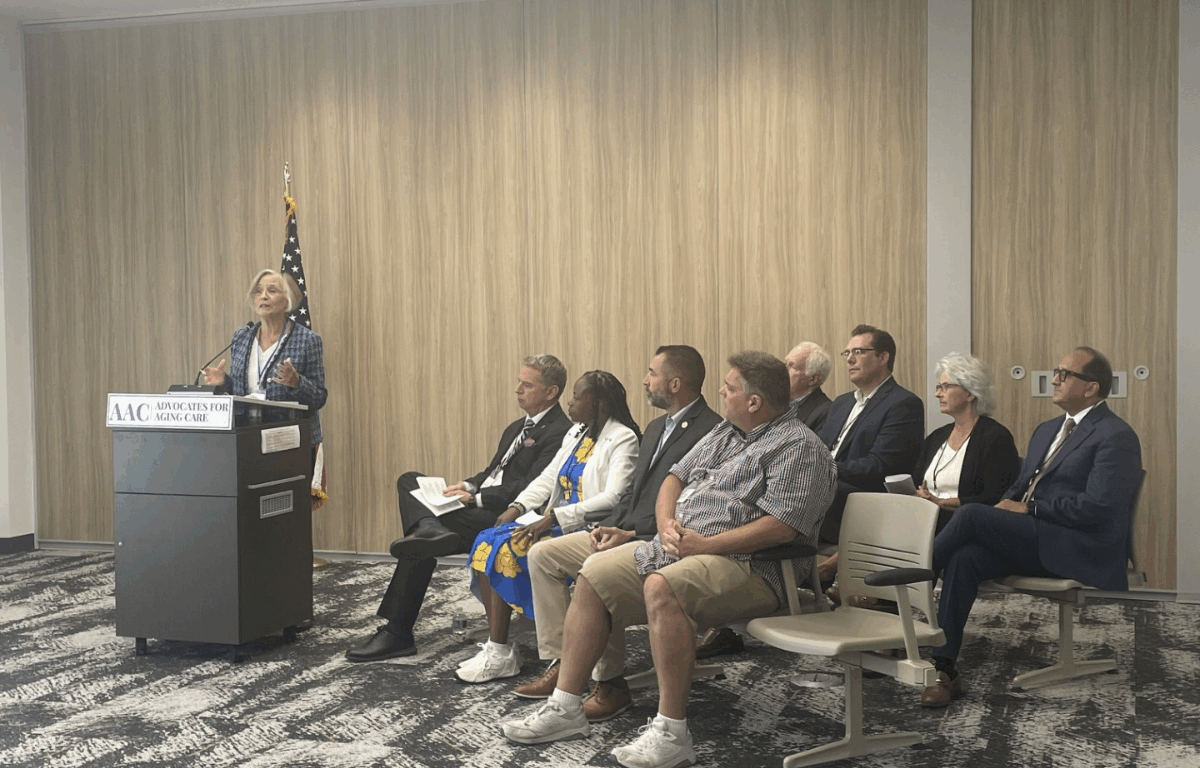URBANA, IL (Chambana Today) — Two years after the closure of three local nursing homes left Champaign County with one of the worst skilled-nursing bed shortages in the state, a local volunteer group is taking major steps toward a solution — with help from a new $500,000 state grant.
Advocates for Aging Care, a nonprofit formed in 2023 to address the county’s long-term care crisis, announced earlier today it has secured state funding to begin work on a new skilled-nursing facility. Officials hope the project will break ground in 2026 and open in 2027, ultimately serving over 100 residents.
Cathy Emanuel, chair of the group’s steering committee, said, “We are a society that is defined by how we take care of our children and our elderly. We want people to settle here because we have the facilities to care for them. Our hospitals cannot house long-term patients indefinitely — we need skilled care options.”
A Growing Crisis
According to the Illinois Department of Public Health, Champaign County needs at least 700 skilled-nursing beds, but only has around 400. Emanuel said the new facility won’t fully close the gap, but it will be a crucial start. Total costs are estimated at $20 million, with local fundraising likely covering $3–5 million.
The $500,000 in state funds — $200,000 for land acquisition and $300,000 for capital improvements — comes from the Illinois Department of Commerce and Economic Opportunity’s Build Illinois Fund, thanks to the efforts of State Sen. Paul Faraci (D-Champaign).
Senator Faraci talked about how this issue affected both his mother and grandmother. “We have to have a shared sense of compassion and community. This is about giving people comfort, dignity, and peace — for them and their families.”
Bipartisan Support
Faraci was joined by Rep. Carol Ammons (D-Urbana), Sen. Chapin Rose (R-Mahomet), and Rep. Brandun Schweizer (R-Danville) at a press conference held at the Bennett Administrative Center in Urbana.
Rose, a key Republican voice in bipartisan legislative efforts like the Mahomet Aquifer protection plan, emphasized the need for unity.
“This will be solved the same way the aquifer was just solved — in a bipartisan fashion,” he said. “This type of care is not a budget line; these are people.”
Ammons, who served on the Champaign County Board when it voted to sell the county nursing home in 2019, called the new project a chance to correct course. “We can track what has happened since that point. That was a decision. It was a policy,” she said. “We now have an opportunity as policymakers to reverse what has happened to our community. In my office, I keep a plant named ‘My Mother’ — a reminder that every decision we make should ask: Would I treat my mother that way? How would we want to be treated when we get there?”
Schweizer added, “A hospital is not a home. If anyone gets stuck navigating this issue, I want them to reach out to my office. We need more skilled nursing facilities across this state.”
A Collaborative Effort
The project is backed by a broad community coalition that includes Carle Health, the University of Illinois Urbana-Champaign, the Champaign-Urbana Public Health District, the Community Foundation of East Central Illinois, and Parkland College, to name a few.
Dr. Kim Kidwell, associate chancellor for strategic partnerships at UIUC, said the university is committed to helping solve the local crisis.
“When something like this shortage happens in our community, it affects each and every one of us,” she said. “We have to work together.”
Brian Zilm, speaking on behalf of U.S. Rep. Nikki Budzinski (D-Springfield), said the congresswoman has been holding roundtables with caregivers and community leaders across the region. “Champaign County has the worst shortage of nursing beds in the entire state,” he said. “This facility will be a huge step forward.”
Faraci also highlighted the need to invest in training the next generation of caregivers. “We’re facing a nursing shortage,” he said. “This project is not just about beds — it’s about building a future where older adults are cared for with love, compassion, and skill.”
Advocates for Aging Care is currently evaluating 10- to 12-acre sites for the facility and negotiating with developers. Community members will be called on to support the upcoming local fundraising effort. “This is about more than healthcare,” Emanuel said. “It’s about what kind of community we want to be.”
Other speakers included Rashid Bashir, PhD, Dean, Grainger College of Engineering at the University of Illinois, and Dr. James Leonard, President and CEO of Carl Health.


